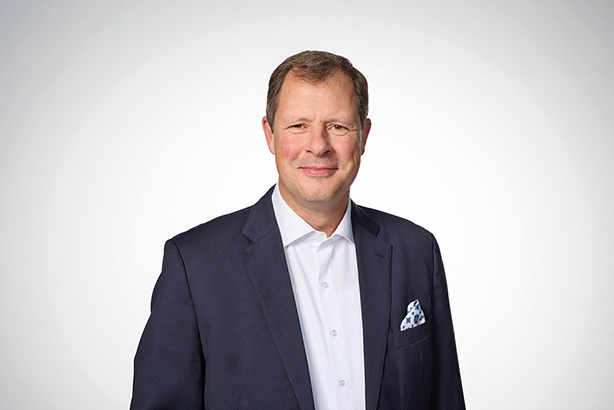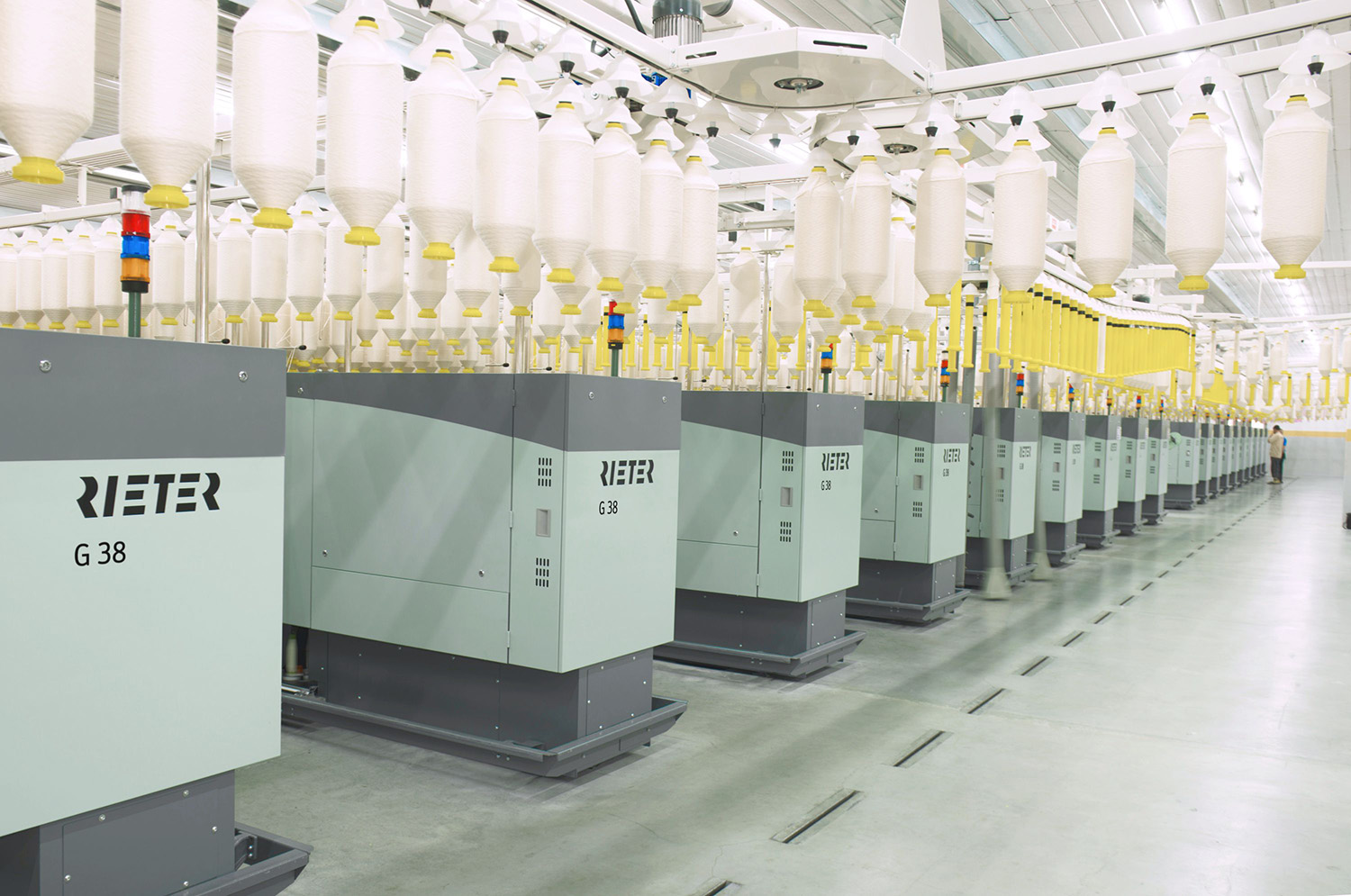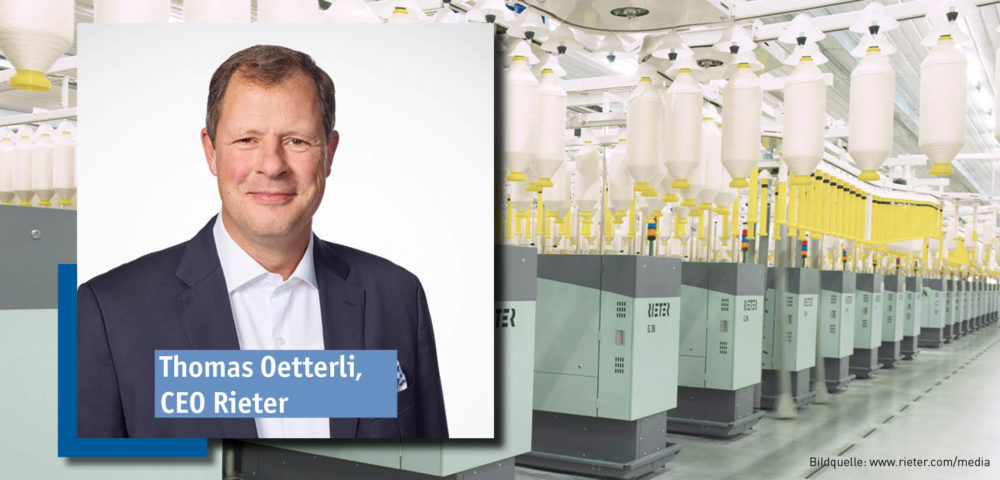Interview with Thomas Oetterli, CEO Rieter

Rieter is the world’s leading supplier of systems for manufacturing yarn from staple fibres in spinning mills. Based in Winterthur, Switzerland, the company develops and manufactures machinery, systems and components used to convert natural and man-made fibres and their blends into yarns in the most cost-efficient manner. Rieter is a member of the Bremen Cotton Exchange. The editors at the Bremen Cotton Report spoke with the group’s CEO Thomas Oetterli about the current challenges in the spinning machine industry, the importance of various markets and the role of cotton as a raw material.
Bremen Cotton Report: To what extent are you feeling the impact of subdued demand from spinning mills in your business?
Thomas Oetterli: Rieter too is feeling the effects of the weak demand from spinning mills. Given the economic situation and ongoing cycle of market downturn, we are expecting the lower than average demand for new systems to continue over the coming months. We anticipate an upturn towards the end of 2023 at the earliest. We also believe that demand for consumables and spare/replacement parts will not recover until the latter part of 2023.
To what extent is the topic of sustainability in the textile industry reflected in your corporate strategy?
Rieter has been committed to sustainability in relation to environment, social and governance (ESG) for many years. ESG is an integral part of our corporate strategy. Two factors come into play here: the development and supply of high-quality, efficient technologies for the spinning process, and keeping our own environmental footprint to a minimum.
Rieter provides cutting-edge technologies for the spinning process that use digitalisation and artificial intelligence to increase energy efficiency and optimise raw material usage. Our recycling spinning systems enable spinning mills to overcome the challenges associated with mechanically recycled fibres, thus helping our customers to profit from the increasing demand for sustainable textiles. At the same time, our recycling systems contribute towards reducing textile waste and help to create the conditions for a circular economy. Alongside these technologies, we also support our customers with textile expertise in relation to the manufacture of innovative yarns made from recycled or chemically produced fibres.
We are working intensively to reduce the ecological footprint in all areas of our company and throughout the entire value chain, in close cooperation with our suppliers.
Rieter is renowned for its high levels of innovation. How does this benefit cotton spinners? What new features do your latest products offer compared with previous models?
As a natural fibre, cotton brings with it some unique challenges when it comes to processing, such as non-homogenous fibre lengths and varying levels of trash content. Rieter machines are designed to obtain the maximum quality from these cotton fibres, whilst ensuring optimum raw material yield.
One example of this is our card, the very heart of the spinning mill. Supported by artificial intelligence, the high-performance C 81 is a pioneer in the industry. The carding gap determines the carding quality. The more accurately the gap can be set, the better the yarn quality. With the Card C 81, intelligent software calculates the ideal gap, which is then perfectly controlled at all times through the electronic, centrally adjustable flat setting. This carding gap control offers a ten per cent increase in production with the same quality. Another new function is the trash level monitor, which monitors the trash content of the fibre tufts in the card infeed and the produced card sliver in real time. At the core of this function is optical image processing with a neural network. The result is optimum raw material yield and predictably high yarn quality.
Combing is recommended if you wish to manufacture premium cotton yarn. The Comber E90 produces up to 100 kilogram of combed sliver per hour, offering the highest productivity levels of all combers on the market. Thanks to innovative technological components, it allows for significantly lower noil extraction and increased flexibility of the spinner in terms of raw material utilisation. As well as making commercial sense, this also underlines our commitment to sustainability and the efficient use of resources.

How do you see the future of cotton spinning in the face of growing competition from synthetic fibres?
The approximately 25 million tonnes of cotton that is spun every year remains an extremely important part of our short staple market. Alongside the advantages of being durable and extremely comfortable to wear, it is also renewable and biodegradable. Instead of a substitution, we are primarily seeing blends with other up-and-coming natural fibres such as hemp. In this respect, cotton is a carrier fibre and therefore a valuable addition. Blends with polyester and viscose also have a role to play in the market, although the sustainability aspect should not be disregarded. The growing circular economy must also be taken into account. Here, recycled cotton fibres are typically mixed with raw cotton to ensure the required yarn quality.
What is Rieter’s strategy on the Asian markets, where does the focus lie?
The Asian countries have traditionally been an important market for Rieter. China continues to be one of our key focal points. There is growing domestic demand here, which means that the local spinning mills are investing more in new machines, digitalisation and automation in order to remain competitive on the domestic market. At the same time, capacities are being relocated to countries such as Pakistan, Bangladesh, Vietnam and Uzbekistan. There is also a need for Rieter’s cutting-edge technology and expertise here.
Is Africa a future market for your business?
In certain areas, Africa is an important market for Rieter. Examples include the Mahalla Project in Egypt where we are equipping textile factories with ring and compact spinning systems in order to reduce energy consumption and increase production. We are immensely proud to be part of this large-scale project and to be able to serve this market.
Thank you very much for the interview!
Interviews embody the opinion of the respective interview partner and do not represent the position of the Bremen Cotton Exchange as neutral, independent institution.

